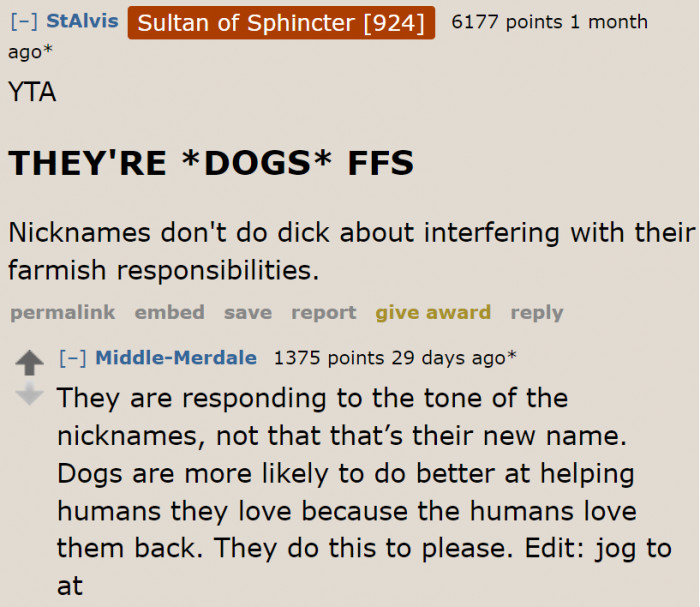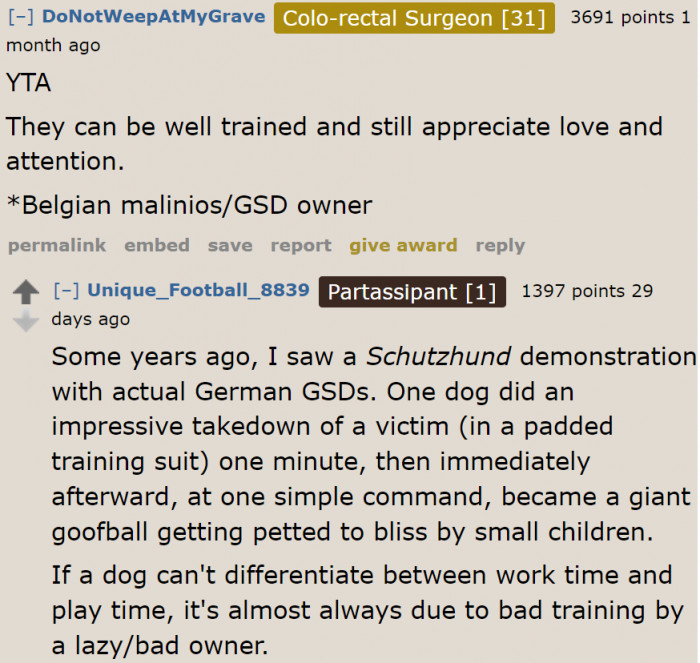Man Who Views His Dogs Only As Workers Stops His Girlfriend From Giving Them Love And Affection
One of the best things about having a dog is that you get to give it a cute nickname. We want nothing more than to express our love for our furry friends, and what better way to do this than by giving them a special name or a term of endearment?
Along with being a personal way to show affection, cute nicknames also make it much easier to remember names. Imagine trying to keep track of all your neighbor's dogs by their full given names!
Dog nicknames are often short and sweet, adding an extra bit of fun and delightfulness to our (and our puppers') lives. Sadly, not everyone agrees on giving these lovely furballs the special names that describe them well.
One man sees his dogs as nothing but workers. He tells the "Am I The A**hole?" (AITA) community that they have important jobs on his family's farm.
He recently noticed his girlfriend calling the two dogs endearing nicknames. She also cuddles with them.
This man believes that they should never be treated as pets because he wants them to be alert for the farm's security. He told his girlfriend to stop calling the dogs by their nicknames and cuddling them.
He even told his girlfriend that he wouldn't allow her to come to the farm if she kept doing these things. The woman sadly left, which made him feel bad.
So he consulted the community about his actions. With many dog lovers on Reddit, it's pretty obvious how the community reacted.
The original poster (OP) has two dogs that he only considers as workers for his farm.

He didn't like his girlfriend giving them cute nicknames and affection.

He consults the community over his actions.

The Psychology of Animal Ownership
The relationship between humans and their pets can be deeply complex, often influenced by individual beliefs about animals and their roles in our lives. In this case, the man's perspective reflects a utilitarian view of animals, focusing strictly on their functional roles rather than their emotional needs.
This perspective can lead to significant emotional disconnects, both for the pets and for the humans involved. Research in animal behavior suggests that pets thrive on social interactions, which are essential for their emotional well-being.
Understanding the Role of Pets
The relationship between humans and their pets can be deeply complex, often rooted in emotional needs. Studies indicate that pets often fulfill roles beyond companionship, serving as sources of comfort, stability, and even purpose. According to research published in the Journal of Social Psychology, individuals often project their emotional needs onto their pets, creating bonds that can lead to strong attachment.
When these attachments are challenged, as in this case, it can lead to significant emotional distress, particularly if one partner views the pets merely as workers rather than companions.
Giving dogs love and affection doesn't make them less functional as guard animals.

Redditors believe that the more dogs are shown affection, the better they are at their jobs.

Even dogs that work for the police and military get cuddles.

According to studies in the field of animal ethics, the belief that animals are mere tools or workers can create harmful dynamics in human-animal relationships. This view tends to ignore the emotional and psychological needs of pets, which can lead to neglect or inappropriate treatment.
For example, a study published in the Journal of Animal Ethics highlights that animals possess complex emotional lives, and mistreating them can result in psychological distress for both the animal and the owner.
In situations where one partner views the pets as workers, it can create a disconnection in the relationship. Dr. Michele Weiner-Davis, a renowned marriage therapist, states, "When partners have conflicting views on pet ownership, it often mirrors deeper issues regarding emotional connection and shared values." This sentiment is echoed by Dr. Terri Orbuch, a relationship researcher, who notes, "Differing perceptions about pets can lead to significant conflict, affecting both the human-animal bond and the dynamics between partners." These insights suggest that underlying emotional needs are not being met, which can lead to resentment and conflict. For more on this topic, visit Michele Weiner-Davis's website and Terri Orbuch's website.
Redditors don't like the way the OP treats his dogs.

Dogs can respond to all their nicknames. They're smart after all.

Looks like the OP needs to be educated about his pets.

Understanding Attachment Styles
The man's behavior may also be indicative of a specific attachment style that prioritizes control and practical utility over emotional connections. According to attachment theory, individuals who have experienced emotional neglect may struggle to form healthy bonds with others, including pets. Dr. Terri Orbuch, a relationship researcher and author, states, "People with insecure attachment styles often have difficulty recognizing and responding to the emotional needs of those around them, including pets." This aligns with findings from her work, which emphasizes the importance of emotional connections in fostering healthy relationships. For more insights, visit her professional website at terriorbuch.com.
The Importance of Communication
Effective communication is vital in resolving conflicts about pet care. A family therapist might recommend using 'I' statements to express feelings without placing blame. This approach can prevent defensiveness and foster understanding, allowing both partners to share their perspectives openly.
Research indicates that couples who engage in constructive communication strategies experience improved relationship satisfaction and reduced conflict. By creating a safe space for discussion, partners can navigate their differing views more effectively.
The dogs are fine getting hugs and cuddles as long as they're not distracted during their guard duty.

A user explains the relationship of guard dogs and livestock.

Redditors pity the dogs because they're not getting the love they deserve.

Furthermore, the dynamics of this relationship can create tension between partners, especially if one person values emotional connection with animals while the other does not. Research in couples therapy indicates that differing values regarding pets can lead to significant conflicts.
For instance, a study published in the Journal of Family Psychology found that couples who engage in open discussions about their beliefs and values regarding pets tend to experience greater relationship satisfaction.
Understanding each other's emotional attachments to pets is crucial for maintaining a healthy relationship. Studies show that when partners acknowledge and validate each other's feelings, it can lead to greater empathy and collaboration. A clinical psychologist emphasizes that working together on pet care can strengthen relational bonds and promote shared responsibilities.
By recognizing the emotional significance of pets, partners can develop a unified approach to their care, enhancing both the human-animal bond and their relationship.
Less love = Less functional

OP's ignorance of dogs shows.

The OP put his Rottweiler in the wrong job.

Strategies for Improving Human-Animal Relationships
It's essential to foster an environment where both pets and their owners can thrive emotionally. Encouraging the man to engage with the dogs in a more affectionate manner could lead to improvements in their behavior and overall emotional health.
Research shows that positive reinforcement and social interactions can significantly enhance animals' well-being. A study from the Journal of Veterinary Behavior emphasizes the importance of affectionate interactions in building trust and reducing anxiety in pets.
Addressing Attachment Styles
Attachment styles significantly influence how individuals relate to pets and each other. Research in attachment theory shows that secure attachment styles often lead to healthier relationships with animals and partners. Conversely, individuals with avoidant or anxious attachment styles may struggle to connect, leading to conflicting views about pet care.
Understanding these dynamics can help partners navigate their emotional responses and foster a more harmonious environment. Couples therapy focused on attachment styles can provide insights into improving relational dynamics.
Dogs are not slaves!

A good example of a farm owner who owns working dogs.

Nicknames won't make dogs bad at doing their jobs.

Additionally, couples therapy might be a viable option for this pair, especially if they find themselves at an impasse regarding their views on pets. Engaging with a professional can help them navigate their differing values and find common ground.
Research indicates that couples who seek therapy to address conflicts regarding shared responsibilities, including pet care, often see improvements in their relationships. A study from the American Psychological Association supports the idea that therapeutic interventions can facilitate healthier communication and understanding.
In cases where one partner feels their emotional needs are unmet, it can lead to feelings of resentment or frustration. A clinical psychologist may recommend exploring these feelings through reflective exercises to better understand underlying motivations. Research suggests that acknowledging and expressing these emotions can lead to healing and improved communication.
Creating a space where both partners feel heard can promote empathy and understanding, allowing them to work together more effectively.
Some Redditors believe the girlfriend should break up with the OP.

Dogs still do their jobs even when given affection.

The OP's view about his dogs is obsolete.

Promoting Empathy in Animal Care
Promoting empathy toward animals is crucial for enhancing the human-animal bond. Encouraging the man to learn more about animal behavior and psychology may help him understand the pets' needs on a deeper level. According to Dr. Daniel Goleman, an emotional intelligence expert, "Developing empathy not only improves our relationships with others but also enhances our ability to connect with animals." Research supports that individuals who cultivate empathy towards animals are more likely to provide better care and create more fulfilling relationships. A study highlighted by Dr. Sue Johnson, a pioneer in couples therapy, emphasizes that empathy training can significantly improve attitudes toward animals.
Exploring Compromise and Collaboration
Finding common ground is essential in resolving conflicts about pet care. A therapist might suggest collaborative problem-solving, where both partners discuss their needs and find solutions that honor both perspectives. Research shows that couples who practice collaborative approaches report higher satisfaction and lower conflict levels in their relationships.
By working together to establish shared responsibilities, partners can strengthen their bond and create a more harmonious environment for their pets.
A Redditor has witnessed working dogs that get lots of love.

Every dog deserves love and affection. We feel sorry for these dogs because when they were finally getting cuddles and attention, their owner took those away from them.
The OP needs to learn more about dogs. We hope the community made him realize the mistakes that he's been making with his pets.
Psychological Analysis
This situation reveals how differing views on pets can lead to significant relationship strain. It's important for partners to communicate openly about their emotional attachments and perspectives on pet ownership. By recognizing each other's feelings, they can work towards a more collaborative approach to caring for their animals.
Analysis generated by AI
Analysis & Alternative Approaches
In conclusion, the relationship between humans and pets can reflect deeper emotional needs and values. Effective communication, understanding attachment styles, and collaborative problem-solving are essential for navigating conflicts about pet care. By fostering empathy and cooperation, couples can enhance their relationships while ensuring the well-being of their pets.
In conclusion, fostering a deeper understanding of the emotional needs of pets is vital for improving the relationships between them and their owners. By encouraging affectionate interactions and addressing underlying attachment issues, both partners can work toward a more harmonious living environment.
Ultimately, recognizing that pets are sentient beings with emotional needs can lead to a more fulfilling experience for both the animals and their owners.
Analysis & Alternative Approaches
In summary, enhancing the human-animal bond requires a commitment to understanding the emotional and psychological needs of pets. Research shows that improving communication and fostering empathy can significantly enhance the relationships between humans and their animals.
By taking steps to address differing values and promoting affectionate interactions, individuals can create a more nurturing environment for their pets, leading to healthier and happier lives for all involved.



